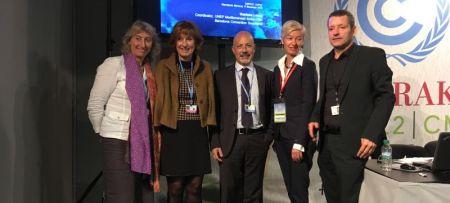According to Ms. Hakima El Haite, Moroccan Minister Delegate in Charge of Environment, between 25,000 and 30,000 people are expected to take part in the 22nd Session of the Conference of Parties (COP22) to the United Nations Framework Convention on Climate Change (UNFCCC) in Bab Ighli, Marrakech, from 7 to 18 November 2016. These figures confirm that climate change and variability is becoming increasingly evident: according to observations and studies referenced in recent IPCC reports, in recent decades, summer heat waves’ intensity, number, and length have increased alongside extreme precipitation events and soil dryness. The Mediterranean region will be heavily impacted by climate change during the 21st century: climate change could exacerbate existing stresses and inequalities within and among countries.
Coastal zones will be particularly impacted with the expected sea-level rise. That is why PAP/RAC representatives took part in two side events of the COP22, both held on 11 November 2016:
- the UNEP/MAP side event to present the instruments developed within the Barcelona Convention and concrete solutions to support the Contracting Parties in their practical implementation of the Regional Climate Change Adaptation Framework and the Integrated Coastal Zone Management Protocol, the latter offering a set of instruments to reduce the impacts of climate change in coastal areas, in particular with regard to coastal urbanization whose trend has been the strongest in the zone closest to the sea, which is at the same time the least desirable for development considering the sea-level rise. One of these instruments are coastal plans that integrate climate change considerations, like the one for the Croatian coastal County of Šibenik-Knin presented during the side event;
- the side event organised by the Tunisian Coastal Agency (APAL) and UNDP in the Tunisian pavilion with the view to strengthen national and local capacities of the country to adapt to climate change in coastal areas and to improve the process of programming, monitoring and coordinating the interventions at the level of the Tunisian coastal zone. The ratification of the ICZM Protocol of the Barcelona Convention was deemed as one of the key steps for addressing the climate change challenge and the national ICZM strategy as one of the major instruments to prevent and reduce its impacts. This side event was also an occasion for the Tunisian partners to announce the organisation in their country in 2017 of a regional conference on innovation and adaptation to climate change in coastal zones.
.jpg)

Area of Reghaia’s coastal plan classified as protected area
07.11.2016
In 2015, the activity on Reghaia’s coastal plan coordinated by PAP/RAC ended with the validation by the steering committee of the final document including 21 recommendations. One o

The Mediterranean at Climate Change COP 22: Time for Action!
17.11.2016
In the framework of the Climate Change COP 22, held in Marrakesh, Morocco, the United Nations Environment Programme / Mediterranean Action Plan – Secretariat to the Barcelona Conve...